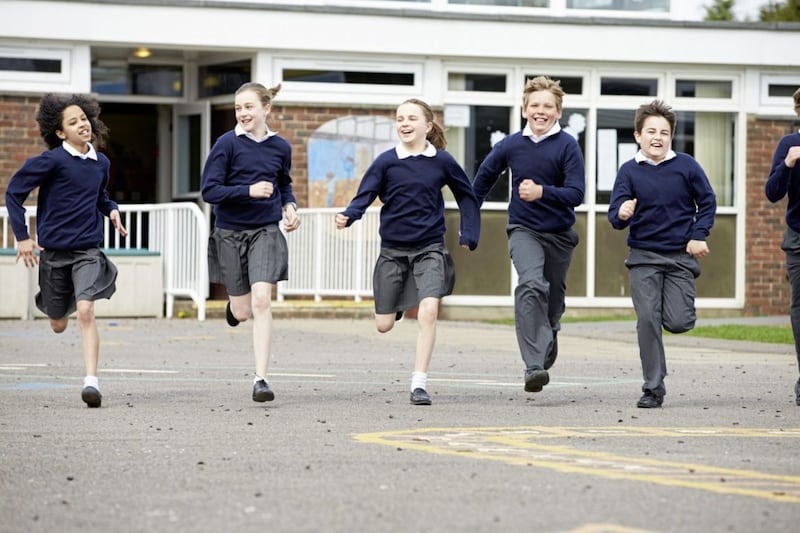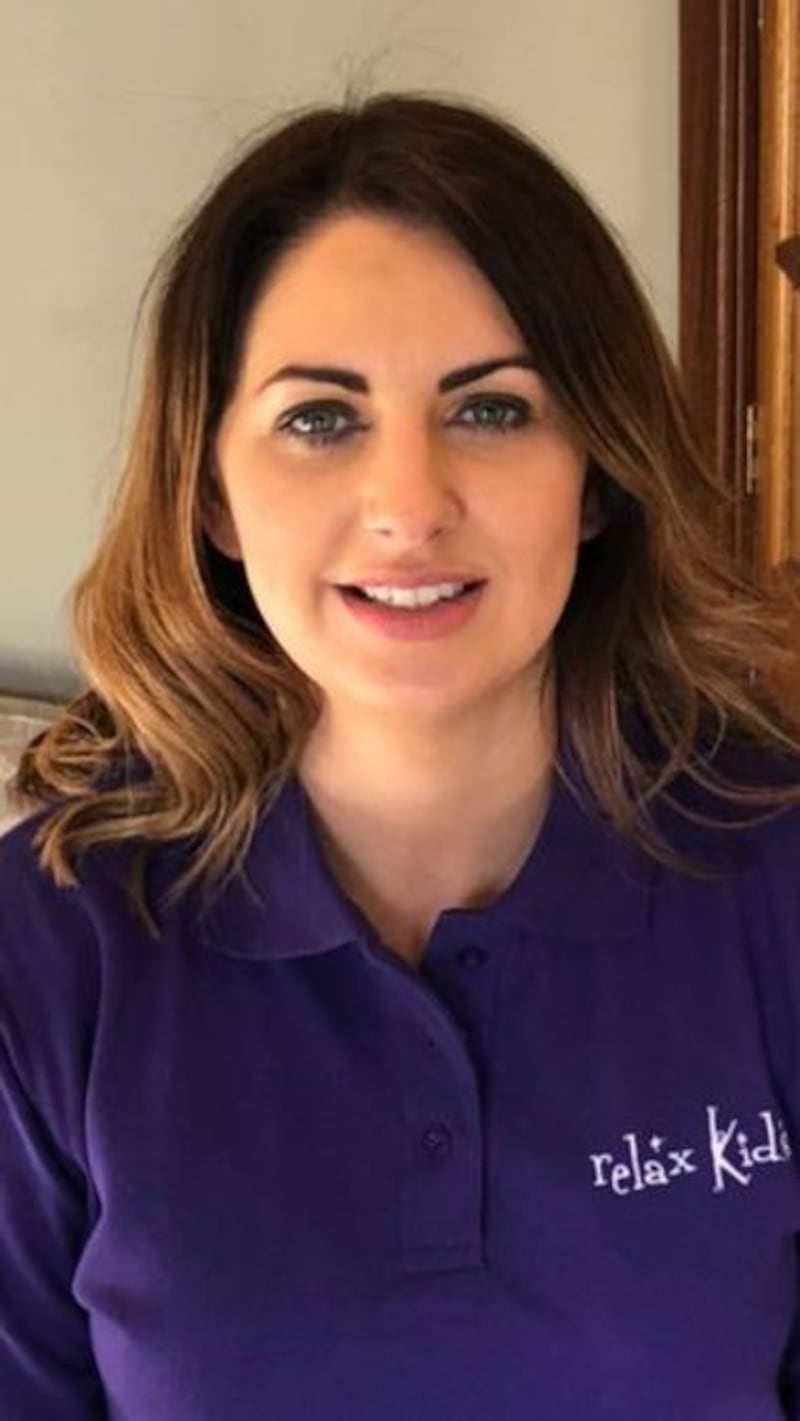TWENTY years ago when Belfast man Freddy Kinnersley, aka Fitness Freddy, began going into schools to teach exercise through fun, he was just one of a handful of coaches doing so in Northern Ireland.
Today, that industry has boomed, with mental wellbeing added to the mix as experts attest to its benefits for children and young people.
And with all children returning to school this week for the first time since before Christmas, the focus on children’s health, and particularly mental health, has never been greater.
A landmark survey released last October by the Northern Ireland Youth Wellbeing Survey revealed that 12.6 per cent of children and young people here experience common mood disorders such as anxiety and depression – around 25 per cent higher than in other parts of the UK – reinforcing the need for prevention and early intervention.
The messages of ‘it’s OK not to be OK’ and ‘it’s OK to talk’ is one that Freddy (50), a parent himself and now a grandparent, reinforces in his mental wellbeing sessions.
And bringing fun back into the classroom is his main aim in the weeks ahead, even though some of the format will be different due to ongoing coronavirus restrictions.
“I have a giant snakes and ladders board so we’ll be playing that, the message being that sometimes in life there are ups, the ladders, and other times you have downs – the snakes – but that is life’s journey and it’s normal,” he says.
Originally from Portadown but now living in Holywood, he has worked with hundreds of schools down the years and at his busiest would have coached up to 20,000 pupils every year. He has seen changes in children in that time, some of them quite surprising.
“Their stretching capacity and flexibility isn’t as good,” he says. “When we were in school there were climbing frames and ropes, so you were getting your full motion and your full stretching above your head.
“Children also got home from school and went out to play. Now they are more likely to be sitting on X-Boxes and phones so their arms and backs are bent and they’re not getting full extension.
“In my classes I explain to them that physical activity will help with mental health as well – better sleep, happier moods and it releases feel-good hormones to help manage stress and anxiety.”
A fitness lover since he was a schoolboy in Portadown, his love of children and passion for sport spurred Freddy to embark on training courses and set up his own business 20 years ago.
Although it started out as Energy Fitness, he changed the name after children kept calling him variations of ‘Fitness Freddy’ and ‘Freddy Fitness’.
And, to this day, he laughs, he gets mums coming up and telling him how much they loved his classes as children, and whole families “waving like mad on the motorway when they spot my van”.

“I love every minute of it. I tell the children that every day I meet new friends,” he adds.
Freddy has also worked with Belfast City Council on the highly successful Teenage Kicks programme, which initially started with the aim of instilling self-confidence in teenagers and has now expanded to incorporate primary school and special needs children.
“I train them for six weeks in each school, teaching them how to dance fitness moves and then they perform in front of an audience of up to 500 in the Ulster Hall,” he explains.
“You can see their confidence growing – the first song, they come out, they’re shy; the second song, they come out, they’re smiling, their heads are high. It’s just brilliant.”
Co Tyrone woman Paula McGilligan, meanwhile, is a relative newcomer to the sector by comparison but equally passionate about children’s wellbeing. She changed career almost three years ago after identifying a “massive demand” in mental health services for children.
The married mother-of-two, who lives in Donaghmore, had been a full-time health visitor for 10 years when she began training as a coach with the Relax Kids franchise in June 2018.
She had originally intended combining it with her health service role but such was the demand that, just four months later, she decided to devote herself to it full-time.
Paula says: “There was such a gap in services. In the NHS, we had CAMHS (Child and Adolescent Mental Health Services) if there was a child with an issue but there was nothing preventative.
“It became really obvious to me that there was more and more need for children’s mental health to be supported.
“Relax Kids really appealed to me. It’s a seven-step programme teaching children life skills. It is recognised by CAMHS and also won a Nursing Standard award. I love the way it is evidence-based.
“We deliver it via themes and through repetition we are building really healthy mental health habits. It means that if children do hit a problem later in life, they have the skills in that tool bank and it’s all delivered in a fun, age-appropriate way.”
Paula gives classes in schools from nursery up to GCSE and is “incredibly busy”. She explains: “The first step in the programme is ‘move’. “We have all learned over lockdown and over the past few years the importance of exercise and what it does in the brain, how it releases the feel-good hormones.
“If a child learns that, they know they can jump on the trampoline, take the dog for a walk or run round the house and that will help their anxiety.”
The other steps are play, with the emphasis on mindful games and avoiding screens; stretch; feel; breathe; believe, which entails repeating positive self-affirmation; and, finally, relax.
“We also work on anxiety, and how their bodies respond to stress and anxiety. The child with a sore tummy, 99 per cent of the time it is anxiety, because there’s a massive amount of [stress-associated hormone] cortisol flowing through their bloodstream,” she explains.

“When you educate children on what it is and where it’s coming from, it’s so empowering for them.”
Themes for lesson plans include ‘monster emotions’ such as anger, sadness, fear and worry; ‘brilliant me’ which focuses on affirming their strengths and good points and ‘chill skills’ for secondary school children.
“Even if a child latches on to one or two of those steps, you are winning. That can be life-saving,” says Paula. “Any schools that I’ve been in, the principals are very mindful of what the children have been through with Covid over the past year.
“I would normally be booked for a morning or afternoon, now I am booked for full days. Schools want the programme delivered not just to a particular class but the whole school.
“Stressed, anxious children don’t learn, and they don’t reach their full potential.
"When I was growing up, we didn’t have the same pressures that children have now. Social media has a massive role to play in that.
“But children are very resilient. Good structure and positive influence will go a long way to helping these children emerge unaffected.
“But I do think mental health in schools is vital – it should not be just an after-school option. It’s as important as all the other subjects.”



